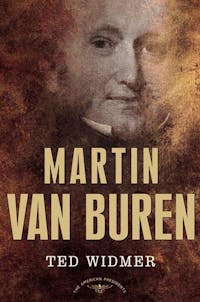Martin Van Buren
The American Presidents Series: The 8th President, 1837-1841
 Download image
Download image
ISBN10: 0805069224
ISBN13: 9780805069228
Hardcover
208 Pages
$34.00
CA$46.00
The stick and dandyish professional politician Martin Van Buren was to all appearances the opposite of his predecessor, the rugged general and Democratic champion Andrew Jackson. Yet he too had an iron temperament, and he would build a lasting legacy as the architect of the modern Democratic Party. Van Buren, a native Dutch speaker, was America's first ethnic president as well as the first New Yorker to hold the office, at a time when Manhattan was bursting with new arrivals. A sharp and adroit political operator, he established himself as a powerhouse in New York, becoming a U.S. senator and, briefly, governor. Under President Jackson, whose election he managed, he served as secretary of state and vice president. His ascendancy to the White House was a brilliant triumph over several famous rivals, including Daniel Webster, Henry Clay, and his mortal enemy, John C. Calhoun, who did everything he could to prevent Van Buren's rise.
Once he held the reins of power, however, Van Buren found the road rougher. His failure to find a middle ground on the most pressing issues of his day—such as the growing conflict over slavery—eroded his effectiveness. But it was his inability to prevent the great banking panic of 1837, and the ensuing economic depression, that all but ensured his defeat for a second term in 1840. His many years of outfoxing his opponents finally caught up with him.
Still, Van Buren enjoyed a remarkably long postpresidency, nearly launching a new political party in 1848 and living until the Civil War, when a young lawyer he had once befriended in Illinois occupied the White House. Despite his short and troubled tenure in office, he fundamentally shaped the politics of the early republic and our modern party system.
Ted Widmer, a veteran of the Clinton White House, vividly brings to life the chaos and contention that plagued Van Buren's presidency—and offers an early lesson in the power of democracy.
Reviews
Praise for Martin Van Buren
"Widmer [delivers a] compendious and readable treatment."—Edwin M. Yoder, Jr., The Washington Post Book World
"In remarkably few pages, Ted Widmer, director of a research center at Washington College in Maryland, rescues Van Buren from what E. P. Thompson once termed 'the enormous condescension of posterity,' by subsuming a failed presidency within a more momentous career. Widmer deftly explains how the pioneering party boss built a formidable machine, using the trick bag of personal contacts and legislative reforms perfected by Lyndon Johnson over a century later . . . Within the ascetic span of a short-biography series, Widmer keenly evokes the environment that enabled Van Buren to thrive . . . Van Buren, as Widmer wisely concludes, was one of those 'not-quite-heroic' figures without whom no democracy would operate for long."—Michael Kazin, The New York Times Book Review
"[This is a] well written and sensible book—especially when Widmer notes that 'it's antidemocratic to expect all of our leaders to be great.'"—Kirkus Reviews
"A brief but elegant portrait of our eighth president . . . Widmer relates [Van Buren's life and times] powerfully, engagingly, and efficiently."—Publishers Weekly



